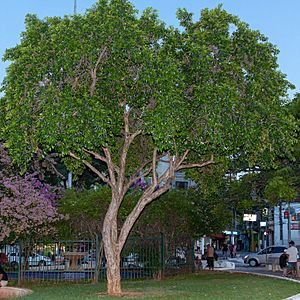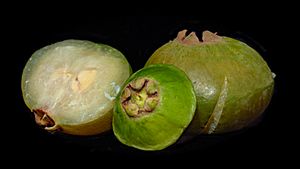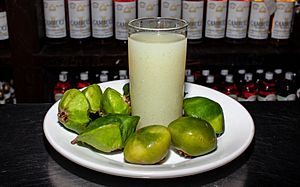Campomanesia phaea facts for kids
Quick facts for kids Campomanesia phaea |
|
|---|---|
 |
|
| Campomanesia phaea | |
| Conservation status | |
| Scientific classification | |
| Genus: |
Campomanesia
|
| Species: |
phaea
|
| Synonyms | |
|
|
Campomanesia phaea is a special plant. It belongs to the Myrtaceae family, which includes many well-known trees and shrubs. This plant is found only in the beautiful Atlantic Forest in southeastern Brazil. You can find it growing in the states of Paraná, Rio de Janeiro, and São Paulo.
In Brazil, the fruit of this plant is called cambuci. The tree itself is known as cambucizeiro. It's good to know that cambuci is different from another fruit called cambucá.
Contents
What is the Cambuci Tree Like?
The Campomanesia phaea tree is a medium-sized tree. It can grow between 4 and 9 metres tall. Its bark often peels off, which is a unique feature.
The tree produces dark green fruits. These fruits are shaped like a saucer and are about 70 millimetres (almost 3 inches) wide.
It is a bit hard to grow new cambuci trees from seeds. Because of this, scientists are trying to grow them using special lab methods. This is called in vitro propagation.
Where Does the Name 'Cambuci' Come From?
The name 'cambuci' has an interesting origin. It comes from the Tupi-Guarani language. This language was spoken by many native people in Brazil.
In Tupi-Guarani, 'cambuci' means 'clay pot'. The fruit was given this name because it looks a lot like the traditional earthenware pots made by the Tupi-Guarani people.
How Do People Use Cambuci?
Even though Campomanesia phaea is rare in the wild, people often grow it. They plant it in their gardens and orchards. They use it for its beauty and for its delicious fruit.
The cambuci fruit has a unique taste. It is a bit acidic and can make your mouth feel a little dry, which is called astringent. You can eat the fruit raw. It is also used to make tasty jellies, sherbets, and juices.
This fruit is very good for you! It is full of important vitamins and minerals. It also contains special plant compounds called phenolic compounds, which are good for your health.
See also
 In Spanish: Cambucí para niños
In Spanish: Cambucí para niños
 | Lonnie Johnson |
 | Granville Woods |
 | Lewis Howard Latimer |
 | James West |




